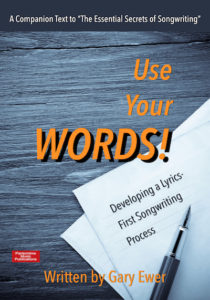 The FREE DEAL continues… Get “Use Your Words!” free with your purchase of “The Essential Secrets of Songwriting 10-eBook Bundle”, and learn how to develop a lyrics-first songwriting process.
The FREE DEAL continues… Get “Use Your Words!” free with your purchase of “The Essential Secrets of Songwriting 10-eBook Bundle”, and learn how to develop a lyrics-first songwriting process.
First, the easy answer: a songwriting collaboration is never a good idea if it means making compromises that you aren’t happy to make. So if you’re the kind of songwriter that finds it relatively easy to conceive of an entire song on your own, where other songwriters’ contributions feel intrusive, a collaboration won’t offer you much.
More often than not, however, a collaboration has the potential to create music that you might not otherwise be able to complete on your own. And that can be true even if, in addition to collaborating, you’re a successful solo songwriter.
So to state it simply, a collaboration makes sense if:
- you can come up with ideas, but are missing all the bits that make a song complete;
- you love improvising on ideas that other songwriters create;
- you love hearing what other songwriters can do with your own musical ideas.
If you are considering pursuing a songwriting partnership, or have been asked to collaborate with someone else to write new songs, here are some things to keep in mind:
- Copyright is always equally shared. There is never a situation where, because you wrote most of a song, you should enjoy most of the copyright. Regardless of who came up with how much of what, a two-person authorship results in an equally-shared copyright.
- Performance and mechanical rights (royalties) can be allocated according to who did how much. If you’ve written most of a song, with a collaborator contributing a line or two of lyric for example, you may come up with an agreement that allows for you to receive the bulk of the royalties (assuming the song is recorded and makes money.)
- Equally-shared royalties is always the best way to go. Unless you’ve got a reason for coming up with complex formulas for each song, it’s best to avoid potential hassles and agree to a 50-50 split of everything. Sure, you may have done the bulk of the songwriting for one particular song, but assuming you’ve got a solid partnership going, the next song may have you being in a much less prominent role. It likely will all even out.
- Start a partnership with a one-song project. Before you agree to an ongoing collaboration, you need to know that your potential artistic partner is a good one. It’s OK — perhaps even advantageous — if you have strengths that differ from your collaborator. Mutual respect, compatible working practices, enjoyment level… these are all things that need to be weighed carefully before you commit to a more permanent arrangement.
- Get it in writing. Describe your partnership in words, and get it on paper for both (or more) of you to sign. Describe every possible eventuality. Are you still both free to write solo? Do you share royalties evenly? If this is a two-person agreement, can you bring a third person in for any one project? How does that affect things? These aren’t overly tough questions, but it’s best to have it all in writing, with all collaborators signing it.
A collaboration works best if you feel that you’re getting something out of the partnership that would be difficult to achieve otherwise.
Don’t feel pressured, and don’t jump into a collaboration simply because it takes you a long time to write songs. Songs that take weeks, months or longer to complete is not typically an indicator that you’re having troubles on your own. Sometimes writing a good song simply takes a bit of time.
But if you enjoy hearing what others might do with your song fragments, or if you love experimenting with other songwriters’ ideas, a collaboration might be part of a creative process that you’ll find rewarding and enjoyable.
 Written by Gary Ewer. Follow Gary on Twitter.
Written by Gary Ewer. Follow Gary on Twitter.
 Get “The Essential Secrets of Songwriting” eBooks. They’ll help you polish your technique, and make you the best songwriter you can be. Comes with a Study Guide, tons of chord progressions, and information covering every aspect of how to write good music.
Get “The Essential Secrets of Songwriting” eBooks. They’ll help you polish your technique, and make you the best songwriter you can be. Comes with a Study Guide, tons of chord progressions, and information covering every aspect of how to write good music.










